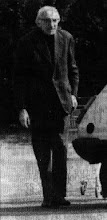Writing on the Tractatus in Beyond the Limits of Thought [pp. 188-190], Graham Priest has made the following point concerning any claim to the effect that a fact or proposition (the considerations are the same) has a certain form. The form of a fact is not a component of a fact in the way that the objects that comprise it are. The form of a fact is the way the objects are structured, and this can no more be another object than the form of a house can be one of the bricks of which it is built. If the form of a fact were just another object, like the objects that comprise that fact, the fact would just be a heap of objects, not a unity. The form of a fact functions in a way that is quite different from the objects that comprise make it: the form is the way the objects are put together, the way they are structured. Hence a fact cannot be about its own form in the way it can be about its objects. If the form is not an object, then there are no facts about it, and therefore no proposition that expresses such facts.
Propositions cannot represent logical form: it is mirrored in them.
What finds its reflection in language, language cannot express. (4.121)
The nature of structure cannot be said. Any attempt to make claims concerning the nature of structure must produce a string of signs that fails to make sense. Such a string will be nonsense (Unsinn). Structural claims are beyond the expressible. What we encounter in TLP is not a language about nonsense but a language of nonsense. We shift, as it were from logic to rhetoric. This is what coming to ‘understand me’, the author of TLP, amounts to.
This is comparable to what Shoshana Felman has described in relation to Lacan as ‘the very torment which inhabits logic’ (Writing and Madness, 125). There is a radical dimension opened up by Wittgenstein, a radical dimension corresponding to that discerned by Lacan. What is involved is nothing other than the loss of the security of a metalanguage, the loss of a ‘claim to a position of exhaustiveness, which would, Felman asserts, be the claim of grammar. If we replace ‘grammar’ by ‘logic’ or ‘logical form’, the implications become clear. We are faced, in TLP as in the work of Lacan, by nothing less than a shift from logic to the inescapable dimension of rhetoric, a shift which Felman describes as follows:
that ‘stumbling block’ which forces discourse to discover that it can only define rhetoric rhetorically, by participating in it, i.e., by stumbling, by elaborating not a grammar of rhetoric but a rhetoric of rhetoric…. (127)
She goes on to cite Lacan: ‘Stumbling, faltering, splitting. In a spoken or written sentence something slips…. It’s there that something else is asking to be realized—something which appears as intentional, of course, but partaking of a strange temporality’ (Four Fundamental Concepts, 25). It is this ‘strange temporality’ that Wittgenstein elaborates in the distinction drawn in his later work between agreement in definition and agreement in judgment, which writers such as Affeldt, or Guetti and Read, have considered in detail. One may see why Wittgenstein thought philosophy should be done in the manner of poetry, and why one might say of TLP that, like the poetry of the moderns, it shows itself to be a ‘a literary thing’.
The Virtues of Knowledge
7 years ago


